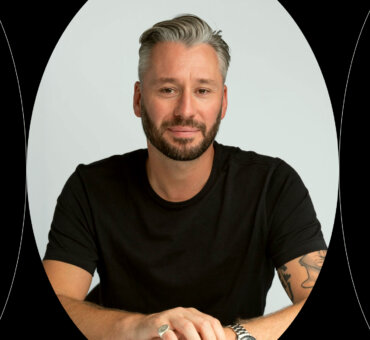If you aren’t careful, creativity can get really narcissistic real fast. In some ways, a bit of narcissism isn’t such a bad thing. You need that drop of ego to fuel your creative drive. But left unchecked, our creative lives can easily become rampant with self-aggrandizement and self-promotion as we become more brand than a person. Most of us are aware of this slippery slope. That’s why we cringe a little bit every time we post a link to a new project or ask people to watch our latest film. Of all the hard things about a creative life, one of the hardest is knowing how to talk about yourself and not sound like a total jerk.
But if you’re going to make a life of creativity, it’s important that you learn how to talk about your work in a way that draws people in rather than pushing them away. It’s important to learn how to talk about yourself without inwardly making yourself sick — or others for that matter.
Here are 4 things to keep in mind:

Oftentimes talking about our work helps us better understand it ⎯ what’s interesting about it, what catches people’s attention, what can be left out.
1. TALKING ABOUT YOUR WORK CAN BE AN ACT OF HUMILITY.
Don’t assume that just because you don’t talk about your work, you’ve got this whole humility thing down. Silence can be as prideful as flat-out bragging. It’s withholding. Your work is “too precious” to let anyone else in. Your film is “too special” to share. Not only does this attitude alienate people from your work, but it also elevates your work to unhealthy heights. (You can’t work up there; there’s no oxygen.) It’s good to talk about your work. To get it out in the open. Don’t shy away from it. Oftentimes talking about our work helps us better understand it ⎯ what’s interesting about it, what catches people’s attention, what can be left out. That’s how the storytelling whizzes at This American Lifedo it. Ira Glass explains:
Understanding what it is that attracts you to the story in the first place is a big part of making the story work. One simple way to test whether your story is worth telling on the radio is to tell it to your friends and notice how you feel. Do you feel like you’re dragging through one tedious moment after another, always on the verge of losing their interest, and sometimes you’re not even sure what the story’s about or why you’re telling certain parts? Or are your friends laughing and buying you drinks and begging you for more details about the characters? When you’re done, does everyone at the table launch into an excited discussion of similar things that happened to them? Heed these signs. If you can’t tell the story compellingly to a friend, it means either you haven’t figured out what the story is really about, or — much more likely — it never will be possible to tell this story compellingly…
All of this to say: there is a way of talking about your work that is not only humble, it’s helpful.
If you’re creating work you truly love, then people will naturally become interested in it through your enthusiasm alone.
2. LOVE WHAT YOU DO. TALK ABOUT WHAT YOU LOVE.
Talking about yourself and your work becomes self-promotion only when you have ulterior motives. Other people can sense it, you can sense it, and the whole thing gets gross. That’s why self-promotion has such negative connotations. The antidote is simply to talk about what you love. That’s it. That’s all you have to do. When people talk about what they love, it’s almost always interesting and rarely feels like marketing. If you’re creating work you truly love, then people will naturally become interested in it through your enthusiasm alone.
Our friend Andy Baker has turned talking about what he loves/does into an awesome website called The Client Blog, which breaks down his work at National Geographic Channel and Nat Geo WILD from his perspective as both a creative director and a client. It’s a great example of how to talk about yourself and your work in a helpful, fascinating way.
Don’t worry about self-promotion. Don’t worry that you might come off as arrogant. Just love what you do and talk about what you love. The rest will take care of itself.
Sometimes the best way to generate interest in your work is to be interested in the work of others first.
3. LISTEN FIRST.
Talking about yourself gets easier in proportion to how much you listen to others. Whether it’s in person or online, taking an interest in other people’s work has an almost immediate reciprocal effect: They’ll take an interest in your work. And when you’re talking to someone who is genuinely interested in what you have to say, self-promotion doesn’t even factor in. You might think that in order to generate interest in your work, you have to talk about it. That’s not always the case. Sometimes the best way to generate interest in your work is to be interested in the work of others first. A simple start can plant the seed for something much bigger. Ask them what they’re working on, what they’re passionate about. Not only will they open up about their work and take interest in your work — but it may just open new avenues you may have missed otherwise.

Sharing the process, and the results, can help build not only your resumé but strengthen your creative community more than you could ever imagine.
4. SHARE SOMETHING EVERY DAY.
If you’ve never talked about yourself and your work, it will feel strange to start doing it. It feels like you’re selling something. However, you can get over that pretty easily with this simple, but not so easy, trick: Share something every day. In his great little book called Show Your Work!: 10 Ways to Share Your Creativity and Get Discovered, Austin Kleon writes:
Once a day, after you’ve done your day’s work…find one little piece of your process that you can share. Where you are in your process will determine what that piece is. If you’re in the very early stages, share your influences and what’s inspiring you. If you’re in the middle of executing a project, write about your methods or share works in progress. If you’ve just completed a project, show the final product, share scraps from the cutting-room floor, or write about what you learned.
Not only does this exercise make it more natural for you to talk about yourself, but it also draws people into your work via your process. To quote Austin Kleon quoting Bobby Solomon: “Put yourself, and your work, out there every day, and you’ll start meeting some amazing people.” You want to meet amazing people, right?
And on that note, no creative works in a vacuum. If your experience is like ours, projects consistently put you in touch with amazing people. Opening up about your work provides a way to point out the people that made it possible. Sharing the process, and the results (a success or not), can help build not only your resumé but strengthen your creative community more than you could ever imagine.
It’s hard to talk about yourself. And it’s even harder to talk about yourself in a productive way ⎯ one that makes your work interesting to others without slipping into self-promotion. Like most things, it takes a little practice to get it right. But we’re convinced that knowing how to speak well about yourself and your work is one of the keys to a long, healthy career. It’s one of the keys to building a strong creative community. It’s one of the keys to doing your very best work.





















































































